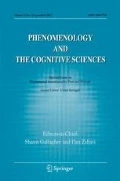Abstract
Fred Adams (Phenomenology and the Cognitive Sciences 9(4): 619–628, 2010) criticizes the theory of embodied cognition (EC) which holds that conceptual and linguistic thought is grounded in the brain’s perceptual and sensorimotor systems. Among other things, Adams claims that: (1) EC is potentially committed to an implausible criterion of sentence meaningfulness; (2) EC lacks claimed advantages over rival accounts of conceptual thought; (3) relevant experimental data do not show constitutive, but only causal, involvement of perception in conception; and (4) EC cannot account for the comprehension of abstract concepts. I respond to Adams that: (1) EC is not committed to an implausible criterion of meaningfulness, though it may be committed to holding that comprehension admits of degrees; (2) EC does have its claimed advantages over rival views; (3) the data do make a strong case for constitutive involvement and (4) a broad and comprehensive EC approach probably can account for the comprehension of abstract concepts.
Similar content being viewed by others
References
Adams, F. (2010). Embodied cognition. Phenomenology and the Cognitive Sciences, 9(4), 619–628.
Adams, F., & Aizawa, K. (2001). The bounds of cognition. Philosophical Psychology, 14(1), 43–64.
Adams, F., & Aizawa, K. (2010). The value of cognitivism in thinking about extended cognition. Phenomenology and the Cognitive Sciences, 9(4), 579–603.
Anderson, M. (2003). Embodied cognition: a field guide. Artificial Intelligence, 149(1), 91–130.
Barsalou, L. (1999). Perceptual symbol systems. The Behavioral and Brain Sciences, 22(4), 577–660.
Barsalou, L. (2003). Abstraction in perceptual symbol systems. Philosophical Transactions: Biological Sciences, 358(1435), 1177–1187.
Barsalou, L., Simmons, W., Barbey, A., & Wilson, C. (2003). Grounding conceptual knowledge in modality-specific systems. Trends in Cognitive Sciences, 7(2), 84–91.
Borghi, A., Glenberg, A., & Kaschak, M. (2004). Putting words in perspective. Memory and Cognition, 32(6), 863–873.
Caramazza, A., & Mahon, B. (2006). The organisation of conceptual knowledge in the brain: the future's past and some future directions. Cognitive Neuropsychology, 23(1), 13–38.
Chomsky, N. (1957). Syntactic structures. The Hague: Mouton.
Gibson, J. (1979). The ecological approach to visual perception. Boston: Houghton Mifflin.
Glenberg, A., & Kaschak, M. (2002). Grounding language in action. Psychonomic Bulletin & Review, 9(3), 558–565.
Glenberg, A., & Robertson, D. (2000). Symbol grounding and meaning: a comparison of high-dimensional and embodied theories of meaning. Journal of Memory and Language, 43(3), 379–401.
Glenberg, A., Havas, D., Becker, R., & Rinck, M. (2005). Grounding language in bodily states: The case for emotion. In D. Pecher & R. Zwaan (Eds.), Grounding cognition: The role of perception and action in memory, language, and thinking (pp. 115–128). Cambridge: Cambridge University Press.
Harnad, S. (1990). The symbol grounding problem. Physica D: Nonlinear Phenomena, 42(1–3), 335–346.
Lakoff, G., & Johnson, M. (1980). Conceptual metaphor in everyday language. The Journal of Philosophy, 77(8), 453–486.
Lakoff, G., & Johnson, M. (1999). Philosophy in the flesh. New York: Basic Books.
Searle, J. (1980). Minds, brains, and programs. The Behavioral and Brain Sciences, 3(3), 417–424.
Wilson, M. (2002). Six views of embodied cognition. Psychonomic Bulletin and Review, 9(4), 625–636.
Author information
Authors and Affiliations
Corresponding author
Rights and permissions
About this article
Cite this article
Letheby, C. In defence of embodied cognition: a reply to Fred Adams. Phenom Cogn Sci 11, 403–414 (2012). https://doi.org/10.1007/s11097-012-9263-1
Published:
Issue Date:
DOI: https://doi.org/10.1007/s11097-012-9263-1



